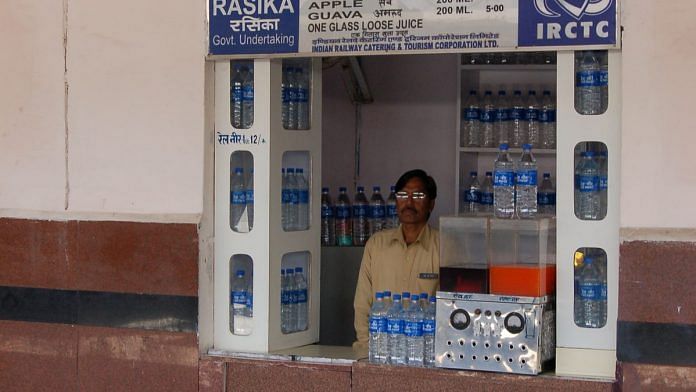New Delhi: If the Narendra Modi cabinet approves a consumer affairs ministry proposal, railway passengers, especially on premium trains such as Tejas Express and Vande Bharat Express, could soon get aluminium or steel water cans instead of plastic water bottles.
Government officials familiar with the matter told ThePrint that the ministry is in talks with the Steel Authority of India (SAIL) to produce these cans in two of the most common grades of food grade stainless steel — 18/8 and 18/10, also known as Type 304.
“We are in talks with SAIL for making water bottles/cans for the railways’ Rail Neer brand. These will be initially offered to passengers aboard premium trains such as Tejas Express and Vande Bharat Express,” said a source in the consumer affairs ministry.
The source said the government is also in consultation with private players, and an expression of interest has also been put up by PepsiCo and Coca Cola to introduce aluminium cans for drinking water, through their respective Aquafina and Dasani brands. The multinational giants are planning to sell drinking water in aluminium cans in the US by 2020.
“We will certainly consider steel/aluminium cans to replace plastic bottles and are resolved to replace plastic bottles phase-wise,” said Siddhartha Singh, public relations officer of the Indian Railways Catering and Tourism Corporation (IRCTC).
“Even now, polymer-based bottles given in Tejas Express degrade by 40 per cent in 80 days, and cost only 15 paise extra to manufacture compared to normal bottles.”
Also read: It’s like demonetisation, plastic industry says about ban confusion, business uncertainty
Will the move be cost-effective?
Officials within the Department of Consumer Affairs, however, have raised questions about the monetary viability of manufacturing aluminium/steel cans.
A senior official from the quality control board of the department, who did not want to be named, told ThePrint: “The cost of making a one-litre plastic bottle comes to around Rs 2.50, whereas a steel/aluminium bottle with the same capacity may cost up to Rs 8.”
A senior scientist from the Bureau of Indian Standards, who is working on the project to standardise the quality of aluminium/steel for water bottles and cans, told ThePrint on conditions of anonymity that the idea isn’t viable without introducing some amount of biodegradable polymer or sugarcane-based/petroleum-based plastic.
The scientist, however, added that this wouldn’t hamper the eco-friendly aspect of the cans, “as they will still degrade up to 70 per cent in two months”, and will be “an easy and cost-effective recycling proposition compared to current plastic PET bottles”.
Also read: Kulhads aren’t exactly the eco-friendly alternative to plastic cups you think they are
What environmentalists say
Environmental experts are sceptical about the proposal as they say it would not contribute to ecological conservation overall.
Sourabh Manuja, a waste management fellow at The Energy and Resources Institute (TERI), said: “Aluminium has an overall 59 per cent more carbon footprint and 45 per cent more production energy requirement than the plastic PET bottles.”
However, he added: “The aluminium industry has a more robust and economically profitable recycling infrastructure than plastic PET bottles.”
Manuja said the emphasis should be on effectively managing and reducing waste, rather substituting it with another easily recyclable one.
“More plastic bottle buy-backs and cheap water-dispensing kiosks should be set up at railway stations to encourage people to create less of plastic water bottle waste,” he said.
Also read: Why single-use plastic ban missed Gandhi Jayanti date




Instead of replacing one disposable by another, why not provide water filters in every bogey of the train and encourage passengers to bring their own reusable bottles to fill. Those who don’t can hire a sanitised reusable aluminium or steel bottle against a deposit and return it or keep it at the end of the journey. The bottle can be made attractive enough to be a souvenir.
Yes sir, you are right. Its unfortunate to see how Papers are writing. One should never forget, no one is above the country. Politicians will come and go but country will be always there. India shall be always known by GOI and not by any individual political party name.
Isn’t this the Central government’s initiative? Why do you call it Modi government? Its Indian government, Union government or Central government. Sad to see even The Print writing it as Modi government.